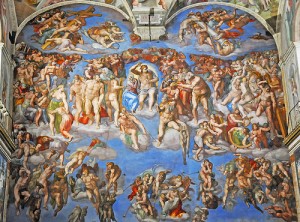
I was recently reading a blog post and the author said that if you blog long enough, eventually you’ll be called a heretic. I hadn’t even been blogging for two months before that happened to me. I’m not sure if that’s a good thing or a bad thing.
Honestly, that’s part of the reason I initially resisted starting a blog or writing a book to begin with. I didn’t want to invite controversy into my life or the life of my family. But when you feel strongly called to do something, there comes a point when you have to let go of fear and simply surrender to the path you’re called to be on.
The furor that arose over some of the things I’d written was far more than I expected. Not only that, some of it was directed at things that I found surprising. I knew that expressing my evolving views on an issue as controversial as homosexuality was akin to kicking a hornet’s nest. I fully expected some hides to be chapped over that, so I was seriously taken aback to hear instead that I was subverting and attacking the heart of the gospel message. Wait. What?
In one of my first articles, I talked about how certain elements of the Christian story can be internalized such that they shape us in unhealthy ways. And I mentioned that I’d lost count of the number of times I’ve heard that we’re enemies of God without the blood of Jesus.
This swiftly became a massive problem because, as I was informed, “enemies of God” and “objects of wrath” are crucial themes that lie at the heart of the gospel message. And thus I was subverting the gospel.
Wow. I’m still perplexed by that. I thought love was at the heart of the gospel message.
To equate growing weary of hearing that I’m an enemy of God without the blood of Jesus with subverting and attacking the gospel message doesn’t compute with me. Especially considering that, in the gospel accounts, Jesus didn’t go around telling people that they were enemies of God. Or objects of wrath, for that matter.
In fact, didn’t Jesus look upon those who were discarded by society and show them that they had value?
Didn’t he say something about how the second most important thing is to love others?
Didn’t he look on people with compassion and talk about them being harassed and helpless, not objects of wrath?
In the parable of the prodigal son, do we get the sense that the dad had to hold back his wrath against the son?
The intense imagery associated with a term like “objects of wrath” simply doesn’t seem to have been crucial to what Jesus was trying to convey. This leads me to think that plenty of his first followers lived their lives without ever entertaining the notion that they were objects of wrath, let alone embracing it as crucial to their understanding of the Jesus message.

Speaking of the Jesus message, I was recently hanging out with some friends and we were reading and discussing some prayers from the Didache, an early church handbook, of sorts. Likely dating from the late first century, it contains various teachings on ethics and provides details on practices such as baptism and communion. Some people have dated the Didache as early as the mid first century, which would make it earlier than at least some of the gospel accounts. But even if it dates to the late first century, that still puts it within the same time frame that the later gospels were written. So it gives us a peek into practices and beliefs of some of the earliest Jesus communities.
I’ve often heard that the first-century church is the model for what God always intended. Well, minus the part about sleeping with in-laws, getting drunk at communion, suing each other, and the like. But seriously, what better way to get a glimpse into the first-century church than looking at a first-century church manual that specifically outlines the church’s practices? One that likely pre-dates the book of Acts, by the way.
In the Didache’s section on the Eucharist (more commonly known as the Lord’s Supper or communion in evangelical America), the prayers that are recited in conjunction with the bread and the cup are quite surprising.
“We thank thee, our Father, for the holy vine of David thy Son, which you have made known to us through Jesus thy Son… We thank thee, our Father, for the life and knowledge which thou hast made known unto us through Jesus thy Son… We thank thee, holy Father, for thy holy name, which thou hast caused to dwell in our hearts, and for the knowledge and faith and immortality which thou hast made known unto us through Jesus thy Son…”
As soon as we were done reading these prayers, everyone was quick to make some very interesting points.
“There’s no talk of sin or forgiveness.”
“It says that Jesus revealed life and knowledge.”
“The focus is on what his life stood for, not what his death stood for.”
“There’s no talk of his death at all.”
It was perplexing. How can this have anything to do with a tradition as sacred and central as the Eucharist?
It almost didn’t compute. After all, we exist within a Christian tradition that tends to highlight very different things when it comes to the bread and the cup. Things like Jesus taking our punishment upon himself, Jesus dying in place of us, our responsibility for his death, and God’s inability to be in the presence of sin. Things ingrained so deeply that labeling ourselves as “objects of wrath” has become a key component to what we’re calling good news.
So what do we do with a crystal-clear indicator that “do this in remembrance of me” meant something very different to some of the earliest communities of Jesus followers? Followers whose focus was on the life that Jesus lived and the knowledge he made known. Followers who didn’t equate the bread and cup with suffering, death, and sin.
Talk about a paradigm shift. And potentially a very, very uncomfortable one, because it challenges our traditional understanding of Jesus.
Suddenly we’re faced with the question of whether our faith is big enough to handle something like this, as well as the possibility that an understanding so crucial to our faith tradition isn’t quite what we’ve always thought.

Can we even sit with and consider these possibilities, rather than responding defensively and with staunch certainty and rigidity?
It may be uncomfortable, for sure. And in order to deflect the discomfort, it can be very easy to point to a given scripture with certainty in order to reinforce an established belief or point of view. But even though we’re often quick to do that, we should consider that the early followers of Jesus simply didn’t have that ability.
Atonement theology is a massive topic, one that I never even knew existed. Theology? What’s to theologize about? Jesus died because of me, plain and simple.
Well, it doesn’t take an extensive commentary on the Didache to realize that it’s actually not plain and simple. The conversation on atonement extends far beyond the prayers found in this early church handbook, but maybe meditating on or otherwise reflecting on these prayers will allow us to consider that the Christian story hasn’t gone uninfluenced from the time of its origins.
Maybe we can open our minds and hearts to the possibility that there has been far more development over the course of the last 2000 years than we’d ever imagine.
And maybe we can consider that not everything is as black and white as we’ve thought.






